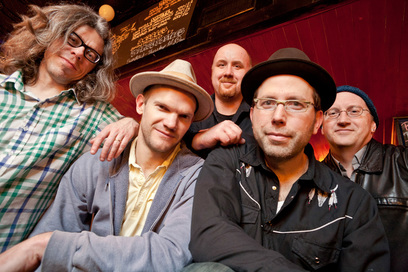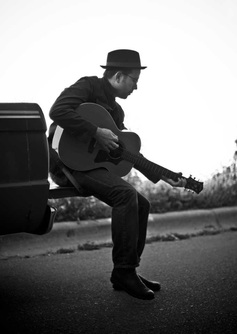
If the Twin Cities have their very own Wilco, Erik Brandt and the Urban Hillbilly Quartet are it.
Like Wilco – and most creative bands before them, from the Beatles to Radiohead – Erik and his band have evolved over time. They followed the college rock/Americana of their debut Living in the City with a pair of albums that added folk, rock, and bluegrass (St. Paul Town and Beautiful Lazy). Their fourth release, Amelia’s Boot, was a turning point, with the maturity of Erik’s songwriting matched tight musicianship. Featuring horn-laden, affecting pop/rock, jazz, and bluegrass, it gained them national recognition.
Impressively, all of those albums were released in a hyper-creative six year period. Following the departure of foundational UHQ members Greg Tippett (bass) and Sena Thompson (fiddle) Erik released his solo debut Green Eyed Alone in 2006. None of his previous work anticipated its mature, melodic, well-crafted pop/rock, and in many ways it is still the high watermark of his songwriting. Straightforward folk album Sometimes (2008) and complex-yet-accessible indie rock of The Long Winter (2012) followed.
Throughout 2015 and 2016 Erik and the band played a series of shows celebrating their twenty year anniversary, sometimes playing their early albums in their entirety. They continue the celebration live on KFAI’s House Party (listen at 90.3 and 106.7 FM in the Twin Cities) at 4:45 on Wednesday March 23. Following their performance they’ll be playing at the venerable 331 Club in Minneapolis from 6-9.
Below is a 12 song playlist that follows their growth from Americana to mature pop/rock.
from the 1997 album Living in the City
On the surface “Blind Horse” is an upbeat mix of folk, bluegrass, and Americana (not to mention a showcase for Brandt’s accordion and Mikey Bales’ fiddle). A closer listen reveals that it is a thoughtful critique of the negative slant of newspapers, as Erik wonders why “the headlines all read blood” and if the reporters who “spin out news seen through a dark lens” were “sleeping when the good news came in.” The ultimate message is hopeful: “can't you see there's a better way calling you?/don't let the darkness of this of this world get you down.”
Snowblind
from the 1997 album Living in the City
“Snowblind” is my favorite Urban Hillbilly Quartet song. Slow and affecting, it is led by a heavily tremolo’d guitar riff and a fittingly understated vocal. The cryptic lyrics (“snowblinded by the fall/hoping you catch me before I hit the wall/never sure how you were seeing me/let me go on as I wanted to be”) are among Brandt’s best.
Living in the City
from the 1998 album St. Paul Town
The reckless, off-the-rails energy of “Living in the City” puts a heavy emphasis on the hillbilly in the band’s name. Bluegrass, country, and pure rock n’ roll have come together concretely and effortlessly. Although it’s easy to get lost in guitarist Jeremy Szopinski’s catchy riff and Mikey Bales fiddle, listen for Brandt’s homage to the city and critique of suburban lifestyle.
Indelible
from the 1999 album Beautiful Lazy
Erik and the band cut loose a little more on their second album Beautiful Lazy. Electric guitars are a lot more prevalent and tracks like “Blood on the Door,” “Trespass,” and “Rat Race” are a weird, dark combination of rock n’ roll and bluegrass. There are some more accessible spots, though, like the title track and the first song that garnered the band international fame, “Indelible.” It’s a good springtime song.
Praetorius (live)
from the 2000 album Lanky But Macho
From around the time of Beautiful Lazy through Amelia’s Boot the Urban Hillbilly Quartet had their most cohesive, experimental lineup. Their packed national and international touring schedule kept them sharp. Long, transcendent instrumental jams like Eastern influenced “Praetorius” shows them at their peak, led by the fluid solos of Sena Thompson on fiddle, Erik on accordion, and Greg Tippett on bass.
Drowsy Maggie/Vlascho (live)
from the 2001 album Hot and Now
“Drowsy Maggie/Vlascho” is another example of the instrumental power of this era of the Urban Hillbilly Quartet (and gives a taste of just how impressive of a live band they were and still are). A high energy take on an old Irish reel transitions into another Eastern influenced tune. Sena’s fiddle, Erik’s accordion, and Milo Mietzner’s variety of percussion give it an international feel, while Jeremy Szopinski’s crunchy guitar gives it a unique rock foundation.
 Photo by Darin Back
Photo by Darin Back
from the 2002 album Amelia’s Boot
Amelia’s Boot was a transitional album for the UHQ. Erik’s songwriting was his most developed and accessible to date, moving far beyond the Americana template of his earlier material. Melodic, horn-laden “Words/Wings” propelled the band into a more mature pop/rock direction.
Helplessly
from the 2002 album Amelia’s Boot
If there was any justice in the world “Helplessly” (with “Words/Wings” as a b-side) would have been the 45 that propelled the UHQ into stardom. It’s certainly catchy enough, but beneath its decidedly pop/rock feel is another set of perceptive, poetic lyrics from Brandt:
When I look in a mirror your eyes burn through me
When I look inside me I see traces of where you used to be
When I enter a room I feel the heat of your departure
When I hear your echo it’s the cruelest form of torture
Thousand Heartaches
from the 2006 album Green Eyed Alone
Songs like “Helplessly” and “Words/Wings” set the stage for the direction Erik’s songwriting took on Green Eyed Alone. There’s even less of an Americana feel, though – even “Words/Wings” prominently featured the accordion – as the straightforward pop of “Thousand Heartaches” shows. Sure, there’s a sweetly strummed banjo in the verses, but it's more to accentuate its poppiness than to add a folk element, something like the fiddle in Wilco’s “Jesus, Etc.”
Revelation Blues
from the 2008 album Bring in the Sails
Although always subtle and creative, there is a spiritual dimension to many of Erik Brandt’s lyrics. “Revelation Blues” is a perfect example, as he uses biblical allusions to build a prophetic statement that critiques contemporary culture (“what you own owns you/you know it’s true/but where your treasure is/your heart will be there too”). It's one of the UHQ’s most intense songs, highlighted by heavy organ from Erik and a soulful guitar riff from Jeremy Szopinski.
Rambling
from the 2008 album Sometimes
Sometimes was written and recorded over a relatively short time in Hungary. Local musicians contributed to its laid back, folky vibe. Writing on a deadline brought out the simpler side of Erik’s songwriting, as jaunty opening track “Rambling” shows.
I Drove Past Your House Today
from the 2012 album The Long Winter
The Long Winter is the first of Erik’s albums that could be called indie rock. It features an impressive variety of sounds, from jazz (“Thoughtless”) to dark folk (“Tuesday Morning Again”) to sweet, McCartney-esque pop (“Wherever You Go”). The catchy melody and double tracked vocals of “I Drove Past Your House Today” speak to the albums pop and indie rock sensibilities. The lyrics, inspired by the death of one of Erik's friends, are warm and affecting.
Be sure to catch Erik Brandt and the Urban Hillbilly Quartet on KFAI’s House Party (listen at 90.3 and 106.7 FM in the Twin Cities) at 4:45 on Wednesday March 23. Following their performance they’ll be playing at the 331 Club in Minneapolis from 7-9.
Erik Ritland is a writer and musician from St. Paul, Minnesota. His blog and podcast Rambling On features commentary on music, sports, culture, and more. He was also Lead Staff Writer for Minnesota culture blog Curious North. Support Erik's music via his Patreon account, reach him via email, or find him on Facebook and Twitter.
 RSS Feed
RSS Feed
